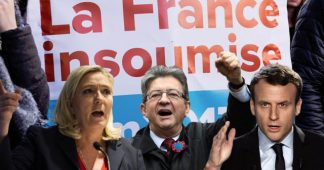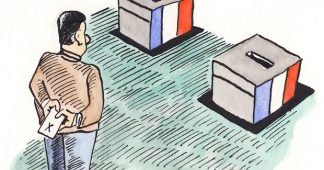By Dimitris Konstantakopoulos
(7th May 2017)
Fear and anger dominate the emotions of the French, and today’s presidential election will not only signify the predominance of one candidate over the other. It will also illustrate the predominance of one emotion over the other.
Support for Macron is primarily motivated by fear of Marine Le Pen. Le Pen’s support derives from the anger against “the system” personified by Macron.
According to the findings of an extensive study published in today’s Monde newspaper, almost 70% of French people are today in the grip of fear and 67% of anger at the political system!
Only 34% profess hope and only 26% enthusiasm when it comes to the French political system.
It is not fear, as is widely but falsely believed, according to researchers, but anger that impels people towards “extremes”, towards “populism”, the fashionable term for antisystemic currents. This is what experts have concluded.
Fear, they note, reinforces calculations of danger and makes people less adventurous in their quest for solutions, and so more conservative.
If the above conclusion is correct, the terrorist attack in Paris on the eve of the first round of the presidential election, whether authentic or a provocation, had the effect of mobilizing for Macron and Fillon people who had not even intended to vote and assisting with the marginalization of Mélenchon. We know from the Gallup polls (e.g.) that a large proportion of Macron’s voters decided at the last minute to vote for him, and that the percentage for Fillon, which had been declining, stabilized after the attack. We cannot, therefore, rule out that the attack had a decisive effect on the outcome of the first round and, by extension, the second.
Contrary to fear, anger is associated with a sense of self-confidence and self-control that leads people ”who have nothing to lose” towards strategies for pursuing radical change.
The survey showed that the prevalence of anger increases the likelihood that any voter, regardless of age, gender, occupation or income, will vote for Le Pen or Mélenchon.
Anxiety impelled voters towards the conservative Fillon. On the contrary, optimism and enthusiasm sent them in the direction of Macron.
Voters with a low level of education, young people, people belonging to the socially deprived (not always the popular) strata), people who would otherwise have abstained, now have a tendency to transform their anger into a vote for the National Front. This psychological condition also explains the indifference they display towards the court cases against Le Pen, in contrast to Fillon’s voters, who are much more sensitive to accusations against their candidate. Le Pen’s support group have no intention of being distracted from organized display of their rage. Marie Le Pen’s appeals to “Forgotten France” win her a premium of great cohesiveness among her supporters.











